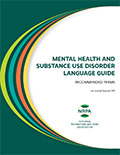The American Psychiatric Association defines addiction, also known as substance use disorder (SUD), as a complex brain disease in which an individual compulsively uses substances despite negative and harmful consequences. Many people with SUD also experience mental illness — a health condition involving a change in emotion, thinking and/or behavior, which often impairs functioning in social, work and family settings. It’s important to understand that substance use and mental health disorders are diseases – much like cancer, diabetes or heart disease. While symptoms may not always be physical in nature, the impact of SUD and mental illness can be life-threatening.
As providers of, and connection points to, public health services and community conditions that protect and promote health and well-being, parks and recreation plays a vital role in addressing substance use and mental health disorders. Park and recreation professionals confront these challenges daily, with many staff on the frontlines responding to substance use, mental health crises and related issues in the public spaces they manage. While substance use and mental health disorders significantly impact communities and individuals across all races, classes, geographies and identities, the park and recreation field has an opportunity to respond to and be a part of the solution.
With funding from the AmerisourceBergen Foundation, NRPA has developed a number of resources to support park and recreation professionals as they address substance use and mental health disorders in their communities:
Mental Health and Substance Use Disorder Language Guide
 Mental illness and SUD remain some of the most stigmatized conditions globally. The language we use, both formally through public messaging or informally through peer-to-peer conversations, can increase or decrease stigma surrounding mental health and substance use disorders. As trusted community leaders, park and recreation professionals can practice and reinforce non-stigmatizing language to treat all people with respect and compassion. Agencies are encouraged to use this guide as a starting ground for addressing stigma within their internal organization and when communicating with external audiences, while beginning to explore more intentional ways to better serve individuals with mental health and substance use disorders.
Mental illness and SUD remain some of the most stigmatized conditions globally. The language we use, both formally through public messaging or informally through peer-to-peer conversations, can increase or decrease stigma surrounding mental health and substance use disorders. As trusted community leaders, park and recreation professionals can practice and reinforce non-stigmatizing language to treat all people with respect and compassion. Agencies are encouraged to use this guide as a starting ground for addressing stigma within their internal organization and when communicating with external audiences, while beginning to explore more intentional ways to better serve individuals with mental health and substance use disorders.
This resource explains the harmful impact of stigmatizing language, provides key guidelines for how to talk about mental illness and SUD, and provides a chart of language substitutions to replace common stigmatizing terms with respectful language. The accompanying abridged resource is a one-page document to share, display and keep on hand for convenient reference.
Access the full guide | Access the Abridged guide
Parks and Recreation: A Comprehensive Response to the Substance Use Crisis
 The report, Parks and Recreation: A Comprehensive Response to the Substance Use Crisis, explores response strategies and recommendations for park and recreation professionals. This resource highlights a variety of tactics and levels of response that focus on prevention, operations and maintenance, public safety, community education, partnership building, staff training and development and more. Strategies are supported by federal, state and local public health agencies and organizations — and are rooted in evidence-based best practices and solutions.
The report, Parks and Recreation: A Comprehensive Response to the Substance Use Crisis, explores response strategies and recommendations for park and recreation professionals. This resource highlights a variety of tactics and levels of response that focus on prevention, operations and maintenance, public safety, community education, partnership building, staff training and development and more. Strategies are supported by federal, state and local public health agencies and organizations — and are rooted in evidence-based best practices and solutions.
Response strategies are grouped into three overarching themes:
- Responding to substance use in parks and recreation
- Supporting community members impacted by substance use
- Focusing efforts on prevention
In addition, five agencies share their experiences with responding to substance use. These case studies provide real-world examples of the strategies and solutions covered, ranging from installing sharps disposal kiosks in parks to providing community education, as well as prevention and awareness training.
Read The Full Report
Parks and Recreation: Addressing Stigma Associated with Substance Use and Mental Health Disorders
 Addiction and mental health conditions can affect anyone, regardless of age, sex, race/ethnicity, background or socioeconomic status. These individuals must constantly battle stigma — the negative attitudes and beliefs directed toward an individual or group of people with certain characteristics, traits or circumstances. Stigma not only impacts society’s ability to address and treat addiction and mental health conditions, but also influences an individual’s likelihood to seek and/or accept treatment due to feelings of shame, fear and guilt. This resource provides an overview of the various stigmas associated with substance use and mental health disorders, as well as how park and recreation professionals can play an instrumental role in addressing and reducing the impacts of stigma in their communities.
Addiction and mental health conditions can affect anyone, regardless of age, sex, race/ethnicity, background or socioeconomic status. These individuals must constantly battle stigma — the negative attitudes and beliefs directed toward an individual or group of people with certain characteristics, traits or circumstances. Stigma not only impacts society’s ability to address and treat addiction and mental health conditions, but also influences an individual’s likelihood to seek and/or accept treatment due to feelings of shame, fear and guilt. This resource provides an overview of the various stigmas associated with substance use and mental health disorders, as well as how park and recreation professionals can play an instrumental role in addressing and reducing the impacts of stigma in their communities.
Read the Full Issue Brief
Parks and Recreation: Prevention Guide Addressing Substance Use and Mental Health Disorders
 The need for integrating more targeted and intentional mental health and substance use prevention programming into community-based services like parks and recreation has never been more evident. Research shows a link between the time these programs are implemented and positive health outcomes later in life. The earlier children and youth receive substance use and mental health education, the less likely they are to begin drug use and experience adverse life outcomes. This resource serves as a guide for park and recreation professionals to better understand their role in youth development, substance use prevention and promotion of mental health. The guide provides an overview of the substance use and mental health crisis in relation to parks and recreation, as well as how professionals can address these challenges and support positive youth development using the outlined strategies.
The need for integrating more targeted and intentional mental health and substance use prevention programming into community-based services like parks and recreation has never been more evident. Research shows a link between the time these programs are implemented and positive health outcomes later in life. The earlier children and youth receive substance use and mental health education, the less likely they are to begin drug use and experience adverse life outcomes. This resource serves as a guide for park and recreation professionals to better understand their role in youth development, substance use prevention and promotion of mental health. The guide provides an overview of the substance use and mental health crisis in relation to parks and recreation, as well as how professionals can address these challenges and support positive youth development using the outlined strategies.
Read the Full Guide
Additional Resources:
Related Learning Opportunities:
Related Blog Posts and Parks and Recreation Magazine Articles:


